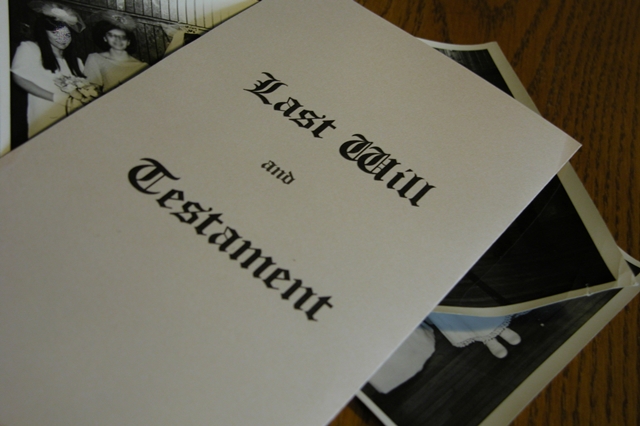Do You Have a Sub-Clicker?

Loved ones typically leave beautiful, sentimental gifts behind, so we often think of bequests as tangible, personal or real property. However, other assets can be gifted, too – digital assets. In this context, digital assets are not intellectual property, such as copyrights or patents, but instead are items purchased and/or stored online or stored by some other electronic means that really take up no physical space per se. Consider this blog for a second – it’s not tangible, though reading it might result in numerous tangible benefits. Yet, even though this blog isn’t touchable, it’s something that I put effort into; something you accessed; and something that is “stored” on my website, which is stored on a chip somewhere in California and on my laptop chip in Illinois. Additionally, on those chips are zeroes and ones, not words, sentences, and paragraphs like you see here. Now, many people have blogs, not only professionals, but laypersons and parents, who are uber professionals, in my opinion. You may have a blog, or a Facebook/Meta page, a Flickr account, email somewhere, or other digital assets. Most folks do. Nevertheless, if a person were to become temporarily or permanently incapacitated, would there be anyone designated to manage those intangibles? More importantly, would they want their intangible, yet significant, account such as Facebook to be kept alive as a memorial? Would they want to assign someone as their sub-Tweeter? While most of us don’t have large rooms in our homes designed as libraries, several thousand people own some kind of e-book reader and millions own computers. What should they do with all that knowledge and (hopefully) good writing? Likewise, millions own digital music, but how many of us know how to transfer that music without violating copyright laws? These questions beg an even larger question – does your account allow you to transfer these assets and, if so, what would your trustee or executor have to show to access the account? If the file was paid for and non-musical, it is probably likely that you have a right to transfer. However, what if, in fact, the file was music, or what if it wasn’t paid for but just a free and cool (showing my vintage here) expression of your life experience. Who actually owns it, i.e., who is the rightful transferor? Well, I suggest taking these 3 steps: Create a document, listing all of your digital accounts, usernames, and pass codes. Give that document to a couple of “digital trustees”; not Aunt Gemma who doesn’t know how to use e-mail yet (and yes, there are aunts and uncles like that), and on the flipside, not to the friend who loses the text – another digital asset – you just sent them and never shows up on time. Research your accounts so you know your rights and the rights of your loved ones. Okay, an attorney could handle number 3 and include it in your will or trust, when the time is right. Still, I hope this encourages thought about one of the most important fingerprints we and one we often forget about, until our FB photo shows at the bottom of our Google search results, that is.
Why There\’s a \”Trust\” in Trustee, Part 2

In Part 1 of this series, I discussed why one should be careful in selecting a trustee. Family members are often considered the most trustworthy with respect to family matters, so people typically select them as trustees. However, this endearing gesture can cause serious problems later: Trust assets could be inadvertently wiped out. A trustee is usually responsible for managing the trust assets. If the trust is significant, the trustee should either have the required financial investment background or the ability to wisely choose someone with the needed background to act as the trust investment advisor. If the trustee is not well informed about investment matters relevant to the trust assets and does not employ someone who is, then the trust funds could dissipate leaving the terms of the trust unfulfilled, and probably one or more displeased beneficiaries. This last point is particularly important if the trust isn’t large, but the beneficiaries depend on its income for health and educational support, for example. Valid claims could go unanswered; or a trust claim could be ignored. The trustee is responsible for responding to or initiating litigation on behalf of the trust. So if a long lost family member who would have been provided for had their whereabouts been known, emerges claiming they should receive under the trust, the trustee should properly address that claim. If the trustee is a family member, however, the problem becomes one of bias against that claim because a valid claim could dilute the current beneficiaries’ shares, possibly including the trustee’s share. Another problem is that it takes time to respond to these claims, time that a family member may not have. Equally important is a trust may have a claim that needs to be litigated. But, if the trustee does not recognize the claim issue, a potential financial award for the beneficiaries may go unnoticed. Co-trustees don’t always agree. While the grantor may have gotten along well with both individuals, when it comes time to make a distribution decision or another decision involving the trust, the co-trustees may not see eye-to-eye and both could have valid perspectives. This type of disagreement starts many long-term family arguments resulting in costly court battles. If nothing else, by choosing a corporate fiduciary, the family will be at peace with each other and at war with someone else. Trust administration responsibilities are time consuming and numerous. The following is an incomplete list of trustee duties: Distributing beneficiary shares Providing a regular accounting to beneficiaries Paying debts, taxes, fees and expenses associated with the trust administration Giving notice to guardians or legal representatives of beneficiaries who are minors or incapacitated Executing documents required for trust administration Settling claims against the trust, not just from possible beneficiaries but from estate creditors Buying insurance for trust assets Perhaps now you’re thinking that a Last Will and Testament may circumvent this “trustee” matter, but that\’s not necessarily true. A Will’s executor or “personal representative” often has the same responsibilities as a trustee. So, establishing a Will not only requires delegation to the executor some of the responsibilities above, but in Illinois, it also entails more costs and more time because of probate. Therefore, it is critical to resist the urge to select a family member as a trustee – or executor – without first giving the decision the thought and discussion it deserves.
Taking the \”Estate\” Out of \”Estate Planning\”

People hearing the term, “estate planning” or even “legacy planning,” often wince, squirm, and cringe unless they are within a very fortunate income tax bracket. However, not one to be deterred, when I receive the rolling eyes or blank stare, I reach into my “unraveling legalese” briefcase and offer the following clarification: Your “estate” is anything you own. It doesn’t have to be a million-dollar home or a 1967 Aston Martin. It can include the 150 classic jazz LPs that belonged to your father, your grandmother’s wedding ring, or you and your spouse’s stubs to the Blackhawks 2010 championship. The goodwill created in your small business is also part of your estate, your legacy. Additionally, included are contracts in which you’ve assigned rights to be effectuated at a certain time, i.e., life insurance. Note, however, that though life insurance is a component of your entire estate, it is not part of your probate estate. Estate planning is the process by which everything you own and will likely own or inherit, as well as your liabilities and obligations, is considered to determine how best to transfer your possessions to your heirs and/or intended beneficiaries. If you own a home, a retirement account, life insurance, have one or more dependents and a dog, deciding on who gets what and why is the process of estate planning. Estate planning is not limited to considering how beneficiaries can inherit tax-free or how one can use the current state and federal tax laws to the advantage of your living trust beneficiaries. Estate planning also includes anticipating scenarios such as ensuring that the needs of dependents or a partner with special challenges is provided for and providing for special beneficiaries who may not yet be born. Hence, estate planning is just planning for your future. It is not a tool merely for the wealthy; estate planning is a tool for the wise.
5 Reasons Why a Will Might Be for You

Generally, I advise clients that trusts are more appropriate, especially if the client wants his or her heirs or beneficiaries to avoid probate. Preventing an estate from going through probate is beneficial if the estate is sizable, i.e., consists of a house, life insurance, a retirement plan or securities, one or more automobiles, and furnishings. However, there are circumstances when a will may be more appropriate: If there is no will, then the property might be distributed to, or in proportions, someone unintended by the decedent. For example, your spouse might only receive 1/3 of the estate’s personal and real property and the remaining 2/3 will go to a child or relative who kicked your dog. Equally egregious is that the property could be distributed to the state, which may have already benefited from receiving several years of income and sales taxes from you. If the estate is modest, for example $100,000 – $200,000, avoiding probate is even more reasonable and it may be possible to waive a probate hearing, so a trust under these circumstances is probably unwarranted. A grantor may not want to designate a trustee and may not want to be a trustee during his or her lifetime.* So, by using a will, a sizable estate will go through probate but each legatee will ultimately be responsible for the preservation and enrichment – or diminution – of his or her own gift. If the testator has minor children and doesn’t want the court to determine guardianship in the event of death or incapacity, then a will can nominate who should be the guardian. A grantor with no desire to continually update a trust document may use a pour-over will, a simple mechanism by which all of the estate is designated to a trust. Okay, so this one is a compromise betwixt the 2 but \”4 1/2 Reasons…\” just didn\’t flow. * A settlor, also referred to as a “grantor,” is the individual who creates the trust.
Lucky Stars Unlucky Heirs: Even the Unfamous Should Have a Valid Will

Approximately 70% of Americans who should leave some sort of testamentary document or trust behind when they die don’t. Why? Because we don’t like thinking about the day when we’re no longer going to be around, let alone talking about it, and heaven forbid planning for it. So we procrastinate until we end up dead with loved ones on the cusp of committing murder or worse – battling each other in probate court until attorneys’ fees have engulfed most of the estate. I offer a few suggestions: Don’t be like Sonny Bono who died without a will and left his widow to battle with a man claiming to be Chaz’s illegitimate half-brother. If you’re married or in a civil union, try not to repeat Barry White’s mistake. “The Maestro” died not only intestate, i.e., without a will, but also without having divorced his first wife with whom he’d been estranged for decades. So if you’re going to put off the inevitable, don’t put off making your divorce or break-up legally valid. The Barry White Wars: (1) between long-time lover and mother of last child and estranged wife of about 20 years and mother of four, and (2) between his 9 children. Not that I think that many would share in the aspirations of Anna Nicole Smith, those who are reading this should consider when drafting your current estate plan that you may have another child after the plan is effectuated. So try not to accidentally disinherit the second child by leaving everything to your “only child, INSERT NAME HERE.” Finally, if you can satisfy suggestions 1 – 3 successfully, remember not to “be like Mike,” Michael Jackson, that is. If you have a trust, actually put something in it. Most know how literally indebted to the world Michael Jackson was, but if he had placed a few actual, fully-paid-for possessions in trust, the creditors would have probably been unlikely to gain access to those assets. A trust with nothing in it is invalid. Although I don’t suggest creating a bequest like the late Torontonian, Charles Millar, leaving everything to the Toronto woman who gave birth the most times in the 10 years following his death, I do suggest having something valid in place to protect your family, if not from others, then from themselves.

